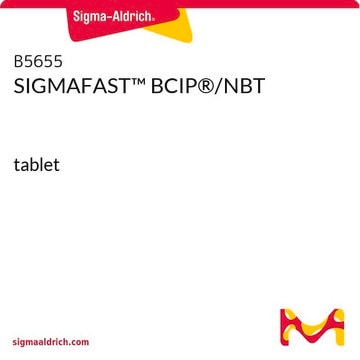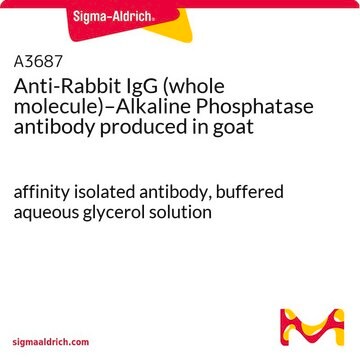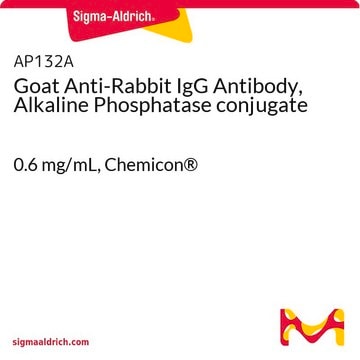A3438
Anti-Mouse IgG (γ-chain specific)−Alkaline Phosphatase antibody produced in goat
affinity isolated antibody, buffered aqueous glycerol solution
Synonyme(s) :
Goat Anti-Mouse IgG (γ-chain specific)−AP
About This Item
Produits recommandés
Source biologique
goat
Conjugué
alkaline phosphatase conjugate
Forme d'anticorps
affinity isolated antibody
Type de produit anticorps
secondary antibodies
Clone
polyclonal
Forme
buffered aqueous glycerol solution
Espèces réactives
mouse
Technique(s)
direct ELISA: 1:30,000
dot blot: 1:30,000
immunohistochemistry (formalin-fixed, paraffin-embedded sections): 1:50
western blot: 1:30,000
Conditions d'expédition
wet ice
Température de stockage
2-8°C
Modification post-traductionnelle de la cible
unmodified
Vous recherchez des produits similaires ? Visite Guide de comparaison des produits
Description générale
Immunogène
Application
Enzyme-linked immunosorbent assay (1 paper)
Actions biochimiques/physiologiques
Forme physique
Notes préparatoires
Remarque sur l'analyse
Clause de non-responsabilité
Vous ne trouvez pas le bon produit ?
Essayez notre Outil de sélection de produits.
Code de la classe de stockage
10 - Combustible liquids
Classe de danger pour l'eau (WGK)
WGK 2
Équipement de protection individuelle
Eyeshields, Gloves, multi-purpose combination respirator cartridge (US)
Certificats d'analyse (COA)
Recherchez un Certificats d'analyse (COA) en saisissant le numéro de lot du produit. Les numéros de lot figurent sur l'étiquette du produit après les mots "Lot" ou "Batch".
Déjà en possession de ce produit ?
Retrouvez la documentation relative aux produits que vous avez récemment achetés dans la Bibliothèque de documents.
Les clients ont également consulté
Notre équipe de scientifiques dispose d'une expérience dans tous les secteurs de la recherche, notamment en sciences de la vie, science des matériaux, synthèse chimique, chromatographie, analyse et dans de nombreux autres domaines..
Contacter notre Service technique










